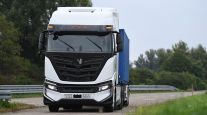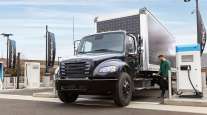Staff Reporter
Trucking Urges Zero-Emission Approach That Goes Beyond EVs
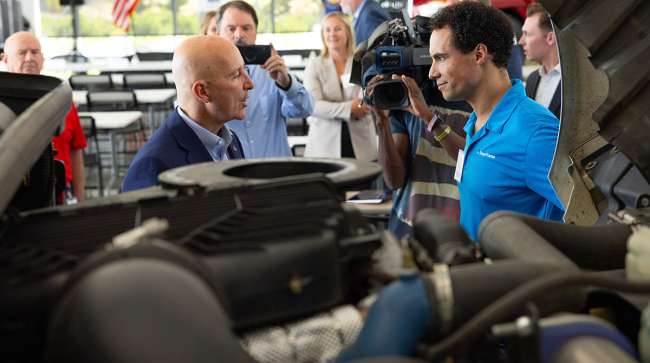
[Stay on top of transportation news: Get TTNews in your inbox.]
Alternatives for reducing emissions that go beyond a federal regulatory push to expand use of battery-electric heavy trucks exist for both near- and longer-term applications, experts said in interviews after a recent roundtable discussion hosted by Sen. Pete Ricketts in his home state of Nebraska.
Ricketts (R-Neb.) is championing his Flex Fuel Fairness Act, which aims to bolster the market for low-carbon liquid fuels such as ethanol by providing incentives for manufacturers to produce flex fuel vehicles alongside battery EVs. He brought trucking industry stakeholders to an Aug. 28 meeting to discuss these opportunities.
“We can take significant steps right now to decarbonizing and reducing the carbon footprint,” said American Trucking Associations Chairman Dan Van Alstine after participating in the meeting. Van Alstine also serves as president and chief operating officer of Ruan Transportation. “If we replace trucks run prior to 2010 with current diesel technology, we’d see an 83% reduction in emissions. Today 60 trucks emit what one truck did in 1988,” he said.
Van Alstine added, “We’re an industry that truly is committed to making sure that we are good stewards of the environment and we’ve demonstrated that over the last several decades.”
Thank you for inviting us to be part of this important discussion today @SenatorRicketts.
The most efficient and expeditious route to a zero-emission future is through pragmatic policies, care for the supply chain, and an all-of-the-above technological approach. https://t.co/2L7gB0X1R0 — American Trucking (@TRUCKINGdotORG) August 28, 2023
He stressed that national and state-level decarbonization discussions should include “attractive alternatives that we need to continue to pursue both as a bridge [to zero emissions], but also for long-term opportunities.” Specifically, he advocated for consideration of renewable fuels such as biodiesel, renewable diesel and hydrogen as well as battery-electric.
Clean Freight Coalition Executive Director Jim Mullen told TT that state-specific challenges exist nationwide.
“Ironically, the state in the country with the oldest fleet of Class 8 trucks is California; 52% of their trucks are older than 2010, the threshold year when a lot of engine standards kicked in,” said Mullen of the Golden State, which is pushing hard on its own set of EV rules. “If you could incentivize California to refresh their fleet with cleaner, newer trucks, that’s an immediate impact on improving the environment. We don’t seem to be talking about that on the regulatory level. It’s all about electrification.”
Mullen said CFC is focused on promoting a smooth transition to zero-emission trucks, but stressed, “It has to be sustainable, it has to be affordable.”
He noted that the cost of EV heavy trucks is a problem, in addition to operational uncertainties like battery range.
“It’s just going to take more trucks, because the range of these trucks is limited,” he said. “Who ends up bearing the financial burden? Of course, the end-consumer does, which is something that really hasn’t been discussed yet.”
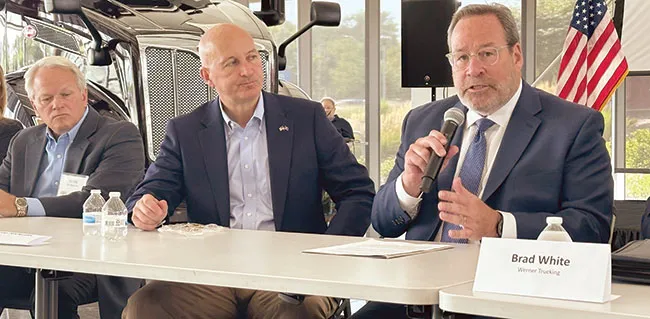
From left: Al Hill of Hill Brothers Transportation, Sen. Pete Ricketts and ATA Chairman Dan Van Alstine. (Kent Grisham/Nebraska Trucking Association)
Van Alstine expressed concern about charging infrastructure. “The time it takes to fuel versus the time it takes to charge is significant,” he said. “When we think about applications, it’s certainly one-size-does-not-fit-all. We do believe there’s great application for electric vehicles. We at Ruan run a number of [electric] yard tractors. They stay right within the yard. You can charge them when it’s convenient and that’s a great application. It’s just a question of whether it is for the longhaul trucker that can run 1,200 miles today without refueling versus 250 miles with electric [batteries].”
Van Alstine echoed Mullen’s stance that trucking is open to evolution, as long as transportation needs are met.
“The industry is not averse to change, but it needs to be done in a careful manner to minimize the risk to the supply chain and understanding the collateral impacts on several fronts, including additional driver capacity, the increased stress on already critical truck parking issues, and safety concerns with heavy-duty batteries,” he said. “Importantly, over 90% of the trucking industry is comprised of small businesses operating five or fewer trucks. Forcing these small businesses into equipment that costs two to three times more than diesel and natural gas equipment will leave them behind, and in peril.”
Nebraska Trucking Association President and CEO Kent Grisham likewise urged a balanced approach.
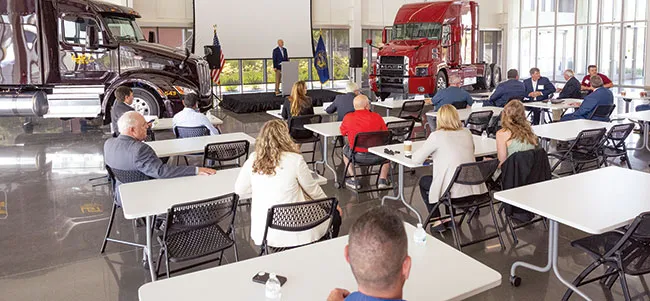
Ricketts hosted the roundtable in his home state of Nebraska. (Office of Sen. Pete Ricketts)
“We’re opposed to being forced into [electrification] long before it’s viable and feasible,” he said. “In a state like Nebraska, we like to deal in facts and employ common sense. Both of those ideals were in abundance in this forum with Senator Ricketts. We all learned from each other and we saw, firsthand, that there are many technologies available right now that will dramatically reduce trucking’s environmental impact. But the radical agenda currently driving the rush to electrification threatens to derail all of those alternatives before they can even be thoroughly tested.”
One alternative on display at the event was an upfitted engine from ClearFlame Engine Technologies that burns ethanol. Per a company statement, the engine is designed to “match the performance of traditional diesel while cutting fuel costs and carbon by more than 40%.”
The Chicago-based company, founded in 2016, said it has completed its first on-road pilots with a U.S. motor carrier, with a second underway and a third planned to start in September. During the first pilot, CEO and co-founder B.J. Johnson said the trucks delivered 100% of their loads and returned average fuel savings of 42% while returning a 45% drop in carbon emissions.
Want more news? Listen to today's daily briefing below or go here for more info:



